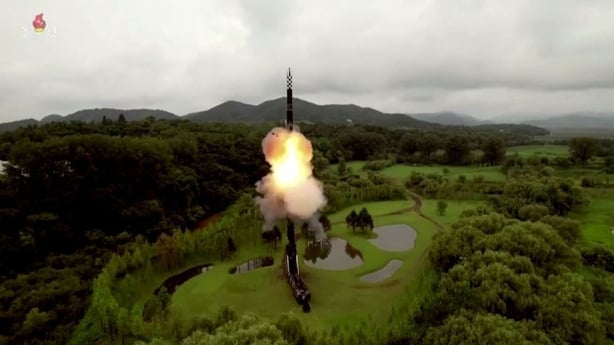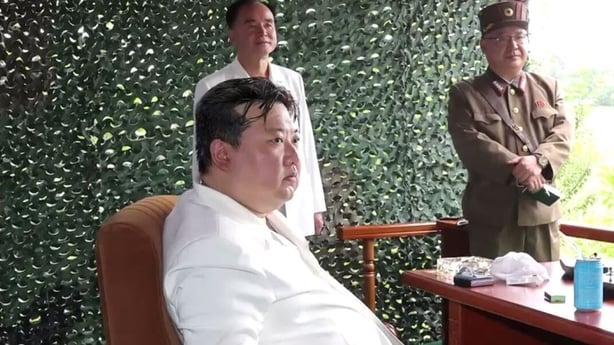North Korean leader Kim Jong Un personally oversaw the successful test of the country's newest intercontinental ballistic missile, according to state media, days after Pyongyang threatened to down any US spy planes that enter its airspace.
A beaming Mr Kim, wearing a white suit and flanked by his wife and key aides, was shown applauding enthusiastically after the launch of the solid-fuel Hwasong-18 yesterday.
The ICBM, which North Korea has fired only once before, in April, flew 1,001km at a maximum altitude of 6,648 km before entering the East Sea, also known as the Sea of Japan, the official Korean Central News Agency reported.
The launch was a "grand explosion" that shook "the whole planet", KCNA said.
State media footage showed the missile blasting off into the sky.
Mr Kim promised that "a series of stronger military offensive" would be launched until the United States and South Korea change their policies towards North Korea, the agency added.
Citing the "unstable situation" on the Korean peninsula, Mr Kim also called for "more intense efforts" to boost North Korea's nuclear arsenal.
The United Nations Security Council will meet publicly today to discuss the launch.
The meeting was requested by the United States, the UK, France, Japan, Albania and Malta.
The UK currently holds the rotating presidency of the security council.
The confirmation of the launch - which the South Korean military had reported yesterday - came with relations between the two Koreas at one of their lowest points.
Diplomacy is stalled and Mr Kim has called for ramping up weapons development, including tactical nuclear arms.

In response, Seoul and Washington have boosted security cooperation, vowing that Pyongyang would face a nuclear response and the "end" of its current government were it to ever use its nuclear weapons against the allies.
Seoul described yesterday's launch as "a grave provocation that damages the peace and security of the Korean peninsula".
The UN, the US and its allies also strongly condemned it.
"This launch is a brazen violation of multiple UN Security Council resolutions and needlessly raises tensions and risks destabilising the security situation in the region," US National Security Council spokesperson Adam Hodge said in a statement.
Southeast Asian foreign ministers said they were "deeply dismayed" by the action and urged North Korea to de-escalate tensions.
Foreign ministers of the Association of Southeast Asian Nations (ASEAN) are meeting in Indonesia with envoys from a number of countries including the US, South Korea, Russia and China.

Pyongyang in February tested the Hwasong-15, which flew a similar 989km.
Yesterday's launch came after North Korea on Monday accused a US spy plane of violating its airspace and condemned Washington's plans to deploy a nuclear missile submarine near the Korean peninsula.
Pyongyang claimed the US had "intensified espionage activities beyond the wartime level", citing "provocative" spy plane flights over eight straight days this month.
"There is no guarantee that such shocking accident as downing of the US Air Force strategic reconnaissance plane will not happen in the East Sea of Korea," a North Korean defence spokesperson said.
Mr Kim's powerful sister Kim Yo Jong also hit out at the purported US spy aircraft airspace violations, and warned that North Korea would take "decisive action" if its maritime military demarcation line was crossed.
The US said in April that one of its nuclear-armed ballistic submarines would visit a South Korean port for the first time in decades, without specifying an exact date.
South Korea and the US are set to start their major annual joint military exercises, known as Ulchi Freedom Shield, next month.
North Korea regards all such exercises as rehearsals for invasion and has described them as "frantic" drills "simulating an all-out war against" Pyongyang.
"I expect the North to continue firing missiles similar to Hwasong-18 through the end of August while the joint South Korea-US military exercises are scheduled," Choi Gi-il, a professor of military studies at Sangji University, said.
Although conducting ICBM launches is expensive, particularly given the dire economic conditions in North Korea with reports of food shortages and starvation, Mr Choi said Pyongyang had "got enough missiles ready" to continue its testing blitz.
South Korean President Yoon Suk Yeol was in Lithuania this week to attend a NATO summit, seeking stronger cooperation over North Korea's growing threats.

